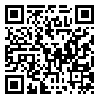Volume 10, Issue 4 (July & August 2019)
BCN 2019, 10(4): 383-392 |
Back to browse issues page
1- Department of Applied Zoology, Faculty of Science & Technology, Mangalore University, Mangalagangothri, Karnataka State, India.
2- Department of Applied Zoology, Mangalore University, Karnataka, India
2- Department of Applied Zoology, Mangalore University, Karnataka, India
Abstract:
Introduction: Neurogenesis mainly occurs in the hippocampus that is sensitive to radiation. More histological changes are reported at higher doses of radiation, while low dose radiation causes cognitive dysfunction in adult mammals. In the present study, we tried to correlate the Endoplasmic Reticulum (ER) stress-mediated hippocampus dysfunction after whole-body gamma radiation of mice.
Methods: Mice were exposed to a series of gamma radiations, followed by isolation of hippocampus. To elucidate the gene expression profile, qPCR was performed for ER stress markers CHOP, BiP, and hippocampal specific genes WFS1, Nectin 3, and Sostdc 1 on the isolated hippocampus. Expression of CHOP and ERK½ were analyzed by western blot on exposure to gamma radiation.
Results: qPCR results showed a significant increase in the expression of ER stress-specific genes CHOP, BiP, and decrease in hippocampal specific genes WFS1, Nectin3, and Sostdc1. Western blot study suggests a significant increase in ER stress proteins like CHOP and ERK½ expression.
Conclusion: Exposure to gamma radiation significantly increased the expression of ER-stress genes, suggesting that ER stress plays a major role in inducing radiation mediated dysfunction of the hippocampus. Also, significant downregulation of WFS1, Nectin3, and Sostdc1 genes suggests radiation mediated effect of hippocampal CA 1, CA 2, and CA 3 regions. A further significant increase of ERK½ shows involvement of the ERK pathway in mediating radiation-induced ER stress dysfunction in mice hippocampus. The present findings may lead to the identification of ER stress as a new marker to study radiation-induced neurodegenerative disorder.
Methods: Mice were exposed to a series of gamma radiations, followed by isolation of hippocampus. To elucidate the gene expression profile, qPCR was performed for ER stress markers CHOP, BiP, and hippocampal specific genes WFS1, Nectin 3, and Sostdc 1 on the isolated hippocampus. Expression of CHOP and ERK½ were analyzed by western blot on exposure to gamma radiation.
Results: qPCR results showed a significant increase in the expression of ER stress-specific genes CHOP, BiP, and decrease in hippocampal specific genes WFS1, Nectin3, and Sostdc1. Western blot study suggests a significant increase in ER stress proteins like CHOP and ERK½ expression.
Conclusion: Exposure to gamma radiation significantly increased the expression of ER-stress genes, suggesting that ER stress plays a major role in inducing radiation mediated dysfunction of the hippocampus. Also, significant downregulation of WFS1, Nectin3, and Sostdc1 genes suggests radiation mediated effect of hippocampal CA 1, CA 2, and CA 3 regions. A further significant increase of ERK½ shows involvement of the ERK pathway in mediating radiation-induced ER stress dysfunction in mice hippocampus. The present findings may lead to the identification of ER stress as a new marker to study radiation-induced neurodegenerative disorder.
Type of Study: Original |
Subject:
Behavioral Neuroscience
Received: 2018/04/23 | Accepted: 2018/12/25 | Published: 2019/07/1
Received: 2018/04/23 | Accepted: 2018/12/25 | Published: 2019/07/1
| Rights and permissions | |
 |
This work is licensed under a Creative Commons Attribution-NonCommercial 4.0 International License. |




